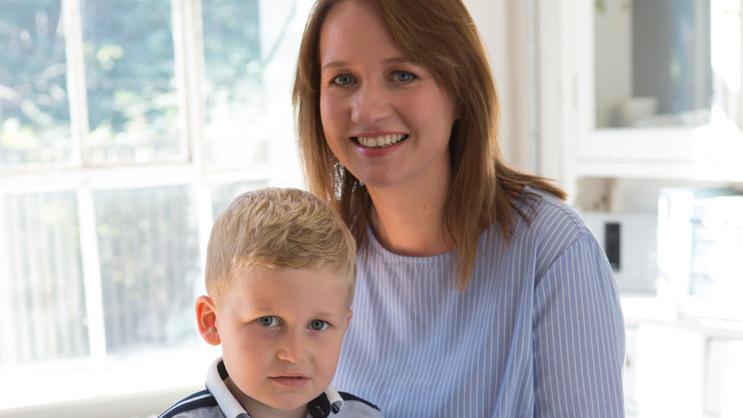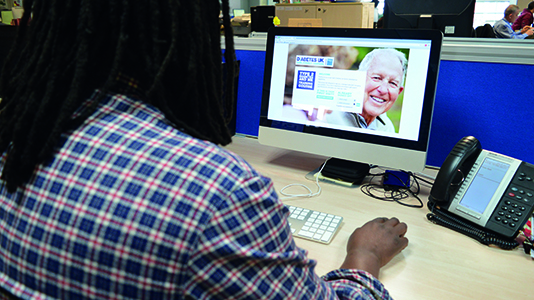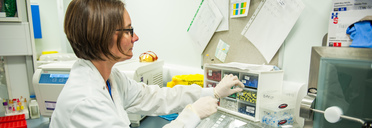
Kathryn Stewart
Son diagnosed age 6 in 2018.
Within two days of his diagnosis, Callum became proud of having his injections.
A year after her son’s diabetes diagnosis, Kathryn and her family are getting to grips with the condition.
customer support
customer support

Within two days of his diagnosis, Callum became proud of having his injections.
A year after her son’s diabetes diagnosis, Kathryn and her family are getting to grips with the condition.
Journey with diabetes
Diagnosis
Callum was six years and three months old when he started displaying symptoms. He was really thirsty, but he plays a lot of football, so me and my husband, Robert, put it down to that. Then he got his hair cut short, and we were commenting that the haircut made him look really skinny.
At the time, it had been snowing and I wanted Callum to enjoy building a snowman and having a snowball fight, but I was also stressed because public transport wasn’t running and I couldn’t get the car dug out, so I was worried about not getting to work.
I thought not being able to get to work was my stress that week, but I had a much bigger problem right under my nose.
I mentioned Callum’s thirst to Robert, and we wondered if maybe the house was too warm, or whether he loved the new orange juice we had bought. I thought I’d keep an eye on Callum, but diabetes still wasn’t on my mind.
Callum had wanted glasses a few months earlier, but when we’d had his vision checked, he was sad to learn he had perfect vision. So when he said his eyes were fuzzy, I thought he was chancing his arm and having another go at getting a pair of glasses. Now I know it was probably high sugars disturbing his vision.
Soon, more people were starting to notice and comment on Callum’s thirst, and it started to really play on my mind. One day, I was driving home from work, and I just had a lightbulb moment. I became so anxious, I pulled over and phoned NHS 24 to explain I was worried about my little boy who was drinking a lot.
By the time NHS 24 phoned back, I was emotional to say the least. The lady I spoke to said diabetes was likely and made an out of hours appointment at the GP. Walking into our appointment, his hand suddenly felt like a different wee hand…thin. I wondered how I hadn’t noticed he had lost weight as I knew that was also a sign of diabetes.
Emotions
The medical staff were very, very reassuring. The hospital doctor reassured us that it wasn’t anything we had done, that we had caught it quickly (his blood ketones were 3. something), that the current prime minster has Type 1 diabetes, and that Callum would be fine. They stressed that he would have a normal life. That it wouldn’t change him. He’d still do football and everything the way he always did. But despite their reassurances, we couldn’t help worrying that Callum’s life would change.
Callum found the first few injections hard, but only the first few. He was so little and diabetes wasn’t a word he even knew, but he trusted us to do the right thing and let us inject him because we told him it was for the best. I can’t explain why, but I felt a huge amount of guilt, like I was somehow betraying his trust by letting it happen. We don’t know why it happened, why Callum’s immune system got it wrong, but I had irrational feelings of self-blame. I wondered if something I’d done during pregnancy had caused Callum’s diabetes.
I wanted to be strong for Callum, because it was happening to him and not me, and I felt guilty for being sad and crying in front of him when I really wanted to be his rock. Callum was strong and took it all in his stride. He liked the hospital bed because it moved and liked showing his family how brave he was doing his finger pricks.
They said children are adaptable and he’d be fine. Recently Callum told us he liked having diabetes because it made him ‘special’. We think he’s still in a bit of a bubble with it. He got a phone, he got to go to Alton Towers and skip the queue. But that won’t always be the case. I think the teenage years will be hard.
I’m at a stage now where I can cope with the idea that he has diabetes, but I find it daunting when I think about him being on his own with it as an adult. For him to have to think about his blood sugar constantly for the rest of his life, it still makes me sad to think about that. On a day-to-day basis it’s actually fine, but when I think about him living with diabetes as an adult, it breaks my heart a little bit. At the moment, Robert and I bear the brunt of it. In time, it’s going to be his burden to carry, and it’s just not what I would have wanted for him.

Treatments
When Callum was first diagnosed, the diabetes specialist nurse said, ‘don’t change your diet. Mould the treatments around what your family would normally eat.’
They were very big on telling us that nothing was going to change and that Callum was going to be the same little boy. If he wants to have a Mars bar - of course any child would need to eat that sort of thing in moderation - but we don’t have to say, ‘you can never eat anything sweet again.’
Callum’s school have also been brilliant. Playtime was a big worry for me. You worry about your children then anyway. Because diabetes was so new to me, I didn’t know what to expect. Now, while Callum is at school, me and my husband, Robert, have data being sent to our mobile phones. The teacher has Callum’s phone on her desk and if he starts to go low, the phone will beep and the teacher knows to take him to the office where someone will treat him.
We feel that Callum’s continous glucose monitoring (CGM) has made it so much easier to do everyday things like going out and playing with his friends or going to the park. If we didn’t have that, we’d worry about him too much to let him go on his own. Robert and I didn’t want to be a constant shadow around him as he grows up.
We joined forums on Facebook with other people who had diabetes. Robert did a lot of reading up about what technology was out there. None of it we could get funded, but since Callum was diagnosed, the Libre is more readily available in Scotland. We tried the Libre for three weeks and it made a big difference. It’s a flash glucose monitor, so you have to scan your phone on it. We found the accuracy wasn’t great but it gave you a good indication of where you were.
Robert started reading up on other things and found the Dexcom G5. It was continuous and would send data to your mobile phone. The hospital told us that diabetes was manageable, but one of our major concerns was that Callum’s life would change. He had a good group of friends. He went to their houses all the time or they came to ours. We thought that was going to change.
The doctor said, ‘you’ll just have to have more parties at your house.’ Ultimately, other parents aren’t going to want to have to do finger-prick tests or give insulin. So this GCM would tell us Callum’s blood glucose if we were in the house and Callum was at a friend’s, we could see what was going on and phone the parents and ask them to give him a drink or a sweetie.
Callum’s quite lucky he has been diagnosed diabetes now, because all this technology is available. It means that now we are in a place where diabetes is inconvenient, but nothing more. Callum has his Dexcom and I-Port, which means he doesn’t feel injections.

Our research is more crucial than ever. We need your help to continue our life-saving work.
Life with diabetes
I’m at a stage now where I can cope with the idea that Callum has diabetes, but I find it daunting when I think about him being on his own with it as an adult. For him to have to think about his blood sugar constantly for the rest of his life, it still makes me sad to think about that.
On a day-to-day basis it’s actually fine, but when I think about him living with diabetes as an adult, it breaks my heart a little bit. At the moment, Robert and I bear the brunt of it. In time, it’s going to be his burden to carry, and it’s just not what I would have wanted for him.
Amelia's story: Raising awareness of the impact of stigma
Read this storyAmelia's story: Completing the Duke of Edinburgh expedition with type 1
Read this story© The British Diabetic Association operating as Diabetes UK, a charity registered in England and Wales (no. 215199) and in Scotland (no. SC039136). A company limited by guarantee registered in England and Wales with (no.00339181) and registered office at Wells Lawrence House, 126 Back Church Lane London E1 1FH
